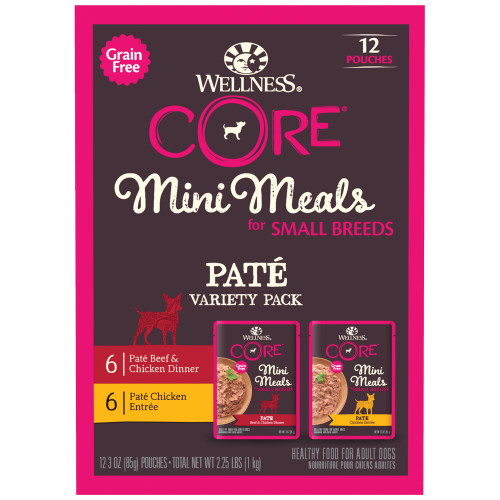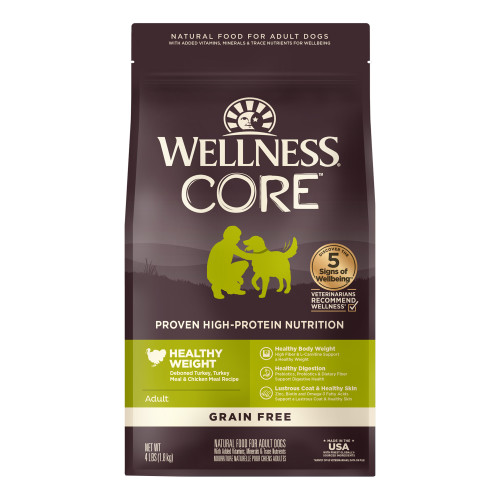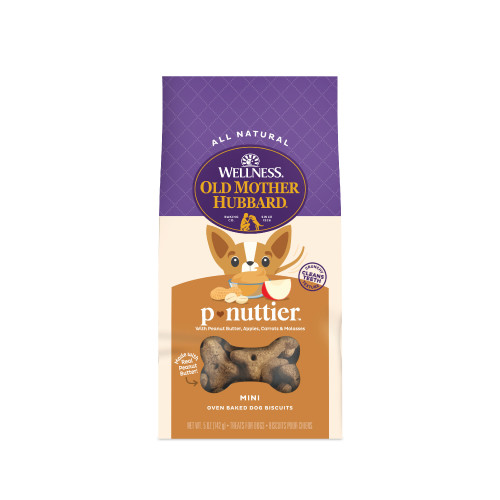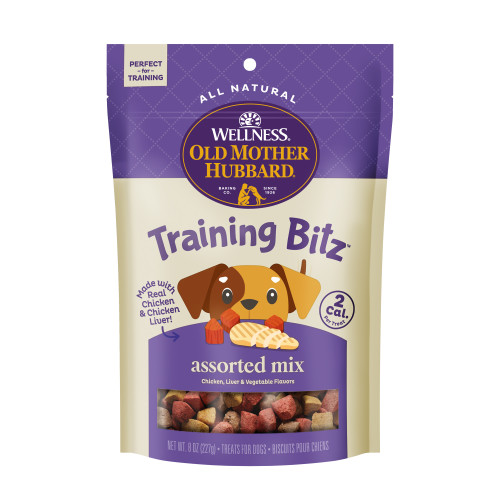February 17, 2022
The Best Food for Senior Dogs
How Customized Nutrition Can Support Your Dog’s Wellbeing
What’s not to love about senior dogs? Loyal and loving, our older dogs are not just devoted companions, but they have truly become part of your family and a much-loved family member at that. So, when it comes to ensuring the health and wellbeing of your older dog, providing them age-specific nutrition, attentive care, and regular vet visits are all important elements to keeping your dog young at heart and allowing them to fulfill a lifetime of wellbeing.
Nutritional Needs Change with Age
Did you know that most dogs become seniors around age 7 years? While each dog will start to move into the senior phase of their life at slightly different times, the age of seven is a time that sees many dogs hit their senior stride. Large and giant breed dogs can move into this phase a little earlier, while smaller breeds will shift to the senior category a bit later in life.
| Breed Size | Senior From |
| Toy Breed | 9 years |
| Small Breed | 7 years |
| Medium Breed | 7 years |
| Large Breed | 6 years |
| Giant Breed | 5 years |
Supporting Their Senior Years
As your dog ages, just like us, their body starts to change, and they may show some common and recognizable signs of aging. You may have noticed for instance that your senior dog is not as energetic as they used to be during walks or play time, they may start to show some stiffness in the morning or even have a few more grey hairs appearing around their muzzle. What often is missed by many pet parents however is that before these visual signs of aging appear, there changes that have started to occur on the inside such as a decline to their immune system, the subtle development of osteoarthritis and changes to their digestion. It is for this reason that paying close attention to your older dogs needs and starting them on an age-specific recipe before the signs of aging appear is one of the most important ways to help them live a long, healthy, and happy life.
Immune Support
The immune system protects the body from invading organisms such as bacteria, viruses, and parasites. It also distinguishes between the bad organisms and good organisms as well as its own healthy cells and tissues, so the body knows which organisms to fight off and which unhealthy cells should be discarded. As dogs age, their immune systems naturally weaken, and they become more susceptible to age-related conditions.
How to help maintain a healthy immune system
Proper nutrition is one way to help support your dog’s immune support. Starting feed your dog senior specific food that’s rich in antioxidants such as vitamins C and E can help keep your dog’s immune system strong and help prevent oxidative damage to cells.
Joint Health
Many older dogs suffer from some of the same debilitating ailments as humans. Like us, dogs start feeling their age in their joints. Weight gain, activity, breed size and age can all place stress on joints and compromise surrounding cartilage, the connective tissue that cushions and protects every joint in the body.
How to help maintain joint health
Keeping your dog lean is important to overall health and can help reduce the stress on their joints.
- Give your dog plenty of appropriate exercise
- Feed portion-controlled meals with appropriate levels of fat and protein derived from lean, fresh protein sources like turkey and chicken. Senior dog foods will further support mobility as they often contain added omega-3 fatty acids to help maintain joint health and are enhanced with glucosamine and chondroitin sulfate, the building blocks for cartilage – the “cushion” in joints.
Vitality and Energy
Although not always visible, your dog’s metabolism changes over time, which can lead to reduced activity and weight gain and may further exacerbate any joint pain or discomfort. Most senior dogs experience a slight to moderate reduction in daily energy needs as they age and while many people think that as dogs’ energy requirements lessen, the need for increased protein and fat decreases, research has shown that while that is true for fat, older healthy dogs have similar protein needs as their younger counterparts and may require higher levels of protein to help maintain vitality and lean muscle mass.
It is important to note however that a protein-rich diet may not be beneficial for older dogs with some medical conditions, especially those in early or end stage kidney failure. If your dog has a kidney disease or another medical condition, discuss the best dietary management with your veterinarian.
How to help maintain energy and optimal body condition.
For optimal health, it’s important to balance appropriate levels of fat and protein derived from lean, fresh protein sources like the turkey and chicken and look for added L-carnitine, a vitamin-like substance that helps the body burn fat. In addition to feeding a senior dog food with high quality protein ingredients, try new physical challenges that provide both exercise and stimulation. It doesn’t have to require much physical strength. Try a new walking route. Let her play with a doggy friend who won’t play too rough or even just take her to a park she’s never been before and let her explore the new smells. For an older dog, this is the perfect exercise and mental stimulation for her total wellbeing.
Weight Management
Just like humans, dogs’ metabolisms slow down as they age, which can lead to weight gain. Gaining extra body weight over the years can cause older dogs to become overweight, which can cause a multitude of health problems and even a shorter lifespan for some dogs. Studies have shown that excessive weight and obesity can put undue stress on weight-bearing joints and is strongly linked with osteoarthritis, especially in older dogs.
How to prevent weight gain
Keeping your dog in an optimal, lean body condition is crucial to helping her live the healthy, happy life she deserves. You can help prevent weight gain, and potentially some of the health problems that often accompany it.
- Control caloric intake
- Offer plenty of exercise, like a walk every day
- Feed a nutrient dense, lower calorie, lower fat senior dog food that is designed to maintain optimal body condition. Senior diets are customized to deliver less calories than the adult companion formulas, due to slightly higher fiber levels and lower fat levels, allowing your dog to feel fuller and help prevent overfeeding.
Sensory Reduction & Decreased Mealtime Enthusiasm
Like humans, dogs’ nervous systems and senses can lose some function with age. A gradual reduction in hearing, vision and/or sense of smell is fairly common for older dogs. Sometimes reduced sense of smell can lead to reduced appetite. Fortunately, there are ways to improve a picky eater’s appetite such as feeding more palatable foods. Unfortunately, there are no proven ways to improve hearing or vision, but there are ways to make the transition easier on both of you.
How to help maintain healthy appetite
When searching for a senior dog food, it’s not only important to pay close attention to each formula’s nutritional analysis, but also to find a food that your dog loves to eat. Senior dog foods that are made with high levels of high-quality proteins, whole fruits and vegetables and other natural ingredients may be tastier and may help entice picky eaters.
- Try gently warming her food to help bring out its appetizing smell
- Add a protein-rich bowl booster or a wet mixer or topper. The softer texture and increased smell of these foods tends to get even the fussiest older dog enthused about mealtime.
Digestive Health
When it comes to what we chose to feed our senior pet, good digestion and nutrient absorption are essential in enabling every dog to get the most out of their food to support that lifetime of wellbeing. While digestive upsets are an issue that can affect dogs at any age, senior dogs have a higher frequency of upsets or sensitivities making digestive health especially important for senior dogs.
How to maintain optimal digestive health
To help maintain all-round wellbeing, a senior dog requires a diet that provides highly digestible ingredients, such as protein from chicken, or turkey as well as fats, healthy carbohydrates, moderately fermentable fiber, prebiotics, probiotics vitamins and minerals.
- Highly digestible nutrition is especially important as a reduction in digestive capabilities can occur as a dog ages. High quality natural ingredients support optimal digestibility to fuel a senior dog’s energy needs.
- Dietary fiber promotes healthy intestines by providing nourishment to intestinal cells that support nutrient absorption and promote overall digestive health
- Prebiotics like Fructooligosaccharides (FOS) or Mannooligosaccharides (MOS) promote the growth of healthy gut bacteria, comparable to those found in probiotic yogurts for humans. By acting as food for the “good bacteria” they can grow in number and crowd out the “bad bacteria” and help maintain the natural balance of a senior dog’s microbiome
- Probiotics coated on the outside of kibble deliver additional populations of good bacteria to further support the optimal microbiome balance
The Best Food for Senior Dogs
Wellness CORE Age Advantage & Senior Recipes:
Wellness Senior recipes are specially formulated for the unique needs of aging dogs from 7+ years. Each recipe is crafted with a precise blend of animal proteins, healthy fats and wholesome carbohydrates that suit an aging dog’s needs. These diets are further fortified with glucosamine hydrochloride & chondroitin sulfate to support hip & joint health, omega fatty acids for skin & coat health, dietary fiber, prebiotics and probiotics for digestive health and guaranteed amounts of vitamins and minerals to support a healthy immune system.







